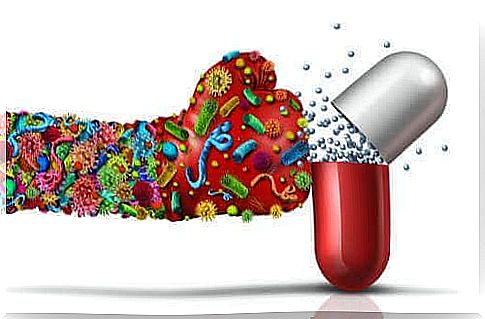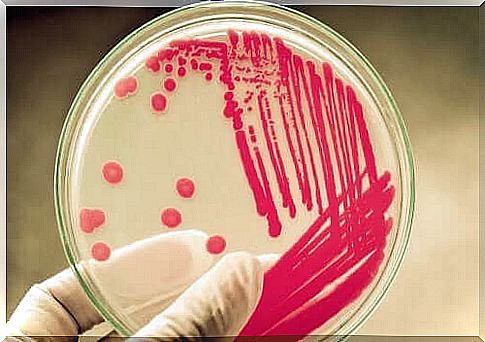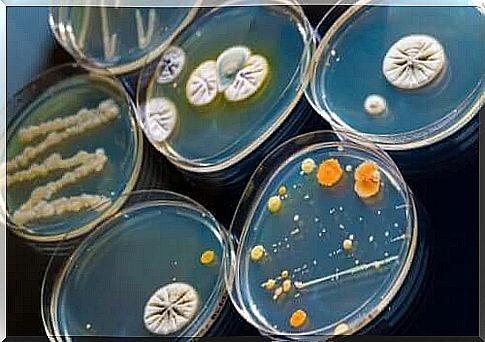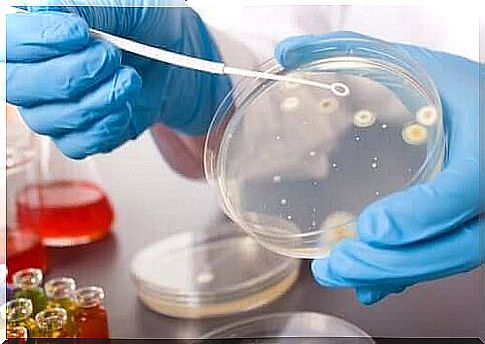What Are Antimicrobials?

Antimicrobials are drugs that can stop the growth of various microorganisms. Whether a particular antimicrobial agent will normally be effective depends on the type of microorganism.
There are several antimicrobial agents that inhibit the growth of bacteria, fungi or parasites. In this article we will therefore take a closer look at the different types of antimicrobials, their uses and their main characteristics.
Types of Antimicrobials
In general, these resources can be classified based on two aspects. Firstly, based on their mechanism of action. Second, based on the type of microorganism.
Classification of antimicrobials according to their mechanism of action

According to this classification, we can distinguish the following 3 groups of antimicrobial agents:
- sterilizers
- disinfectants
- antiseptics and chemotherapeutics
Sterilizers
Sterilizers are capable of killing any type of microorganism (link in English). Two of the best known sterilizers are glutaraldehyde and ethylene oxide. Furthermore, physical methods are also used for this purpose such as:
- Warmth
- filtration
- ionising radiation
Disinfectants
Doctors use disinfectants to kill microorganisms on surfaces. They do this because of the toxic effects they usually cause on living tissue. In general, some of the most commonly used disinfectants are alcohol and iodine compounds such as Betadine.
It is important to distinguish between disinfection and sterilization. Unlike sterilizers, disinfectants are not able to completely kill microorganisms.
Antiseptics and Chemotherapeutics
Both have similar uses. However, one of the differences is that antiseptics are applied directly to damaged tissue to prevent the growth of microorganisms. However, chemotherapy drugs are administered intravenously.
Classification of antimicrobials according to the type of microorganism

Below we will classify antimicrobials according to the microorganisms against which they can be used.
Antibiotics
The term antibiotic (plural antibiotics) refers to a chemical that kills or inhibits the growth of certain types of sensitive microorganisms. As their name suggests, doctors use antibiotics to treat bacterial infections.
Medical specialists use these drugs in veterinary medicine as well as in humans. In addition, they use it along with antiparasitic agents and other antimicrobial agents. In general, the goal of antibiotic treatment is to kill an unwanted microorganism.
It is important to note that both self-medication with and incorrect use of antibiotics is a serious public health problem. The reason for this is that bacteria can develop resistance mechanisms to various antibiotics. Thus, the initially effective treatments no longer work. This makes the antibiotics ineffective.
Antifungals
These are also called antifungals. In general, these are substances that stop or kill the growth of certain fungi. As with antibiotics, certain people self-medicate and misuse these drugs. Unfortunately, this causes microorganisms to develop resistance to common drugs.
Some of the best-known antifungals include:
- itraconazole
- posaconazole
- fluconazole
- voriconazole
- caspofungin
Antiparasitic Agents

These antimicrobials are used in veterinary medicine as well as in humans. They fight infections caused by bacteria and parasites.
These agents are also used to treat some types of cancer. The best known antiparasitic agents are generally anthelmintic and antiprotozoal agents such as:
- albendazole
- mebendazole
- trimethoprim
- paromomycin
- metronidazole
- ivermectin
Today, scientists are trying to discover other parasitic agents with fewer side effects. In addition, they are also trying to combat the development of parasite resistance to commercial drugs.
Antivirals
Medical specialists use these drugs to treat viral infections. Unfortunately, they cannot (yet) cure the disease. However, they can relieve symptoms and reduce the risk of complications. In general, there are antivirals for every type of virus. However, they must be prescribed by a doctor.
Conclusion
In general, antimicrobials are capable of inhibiting or stopping the growth of various microorganisms by killing the microorganisms. Doctors choose the best option depending on both the specific infection and the overall situation.
Microbial drugs such as antibacterials, antifungals, antiparasitics, and antivirals are not available without a prescription. Self-medication with these types of drugs promotes the development of resistance to microorganisms. As a result, the treatment may be less effective for everyone.









